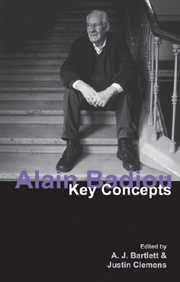Book contents
- Frontmatter
- Contents
- Contributors
- Acknowledgements
- Abbreviations
- Miscellaneous Frontmatter
- Introduction: Badiou's form
- 1 Biography and early works
- PART I THE FOUNDATIONS OF BADIOU'S THOUGHT
- PART II BADIOU'S KEY CONCEPTS OR “CONDITIONS”
- PART III BADIOU'S ENGAGEMENT WITH KEY PHILOSOPHERS
- 10 Plato
- 11 Spinoza
- 12 Kant
- 13 Hegel
- 14 Heidegger
- 15 Lacan
- 16 Deleuze
- 17 New directions
- Afterword: Badiou's futures
- Bibliography
- Index
10 - Plato
from PART III - BADIOU'S ENGAGEMENT WITH KEY PHILOSOPHERS
- Frontmatter
- Contents
- Contributors
- Acknowledgements
- Abbreviations
- Miscellaneous Frontmatter
- Introduction: Badiou's form
- 1 Biography and early works
- PART I THE FOUNDATIONS OF BADIOU'S THOUGHT
- PART II BADIOU'S KEY CONCEPTS OR “CONDITIONS”
- PART III BADIOU'S ENGAGEMENT WITH KEY PHILOSOPHERS
- 10 Plato
- 11 Spinoza
- 12 Kant
- 13 Hegel
- 14 Heidegger
- 15 Lacan
- 16 Deleuze
- 17 New directions
- Afterword: Badiou's futures
- Bibliography
- Index
Summary
A wise man follows his guide but is not ignorant of his surroundings.
(Phaedo 108a)Alain Badiou identifies his own philosophical project as a “contemporary Platonism”. To be a Platonist is to be faithful to both the mathematical conditioning of thought – whereby the most rigorous thinking of being passes through the most contemporary discoveries in mathematics – and to insist, against the temper of the times, that “there are truths”; that there is something other than opinion, the encyclopaedia, or the “state” and that consequentially such truths are rigorously subjective. Badiou's Platonism affirms “an ontology of the pure multiple without renouncing truth”.
The resources Badiou derives from Plato are extensive: explicitly, the Platonic institution of the speculative, aporetic and formal divisions between being and appearing, truth and opinion, philosophy and sophistry, mathematics and poetry; implicitly, Plato's formal demonstration of what constitutes philosophical discourse as a practice of separation, division and invention. Philosophy, for both, is subtractive of all forms of “sophistic” knowledge, thereby holding in abeyance both “the tutelary figure of the One” (TW 37) and the resigned conservatism of the “rhetoric of instants” (LW 511). That Plato's dialogues are concerned with mathematics, art, love and politics – Badiou's four conditions for the existence of philosophy (the discourses wherein truths are played out) – confirms Plato's foundational importance for Badiou.
The direct consequence is a philosophy that engages in direct, rigorous and polemical confrontation with the greater part of the philosophy of the past century and a half: from Nietzsche's curative decree against the Plato-sickness, contemporary philosophy has retreated, Badiou contends, to the sophistic logic of despair – the discourse of “ends” with its attendant conceit and varia (MP 27–32).
- Type
- Chapter
- Information
- Alain BadiouKey Concepts, pp. 107 - 117Publisher: Acumen PublishingPrint publication year: 2010



